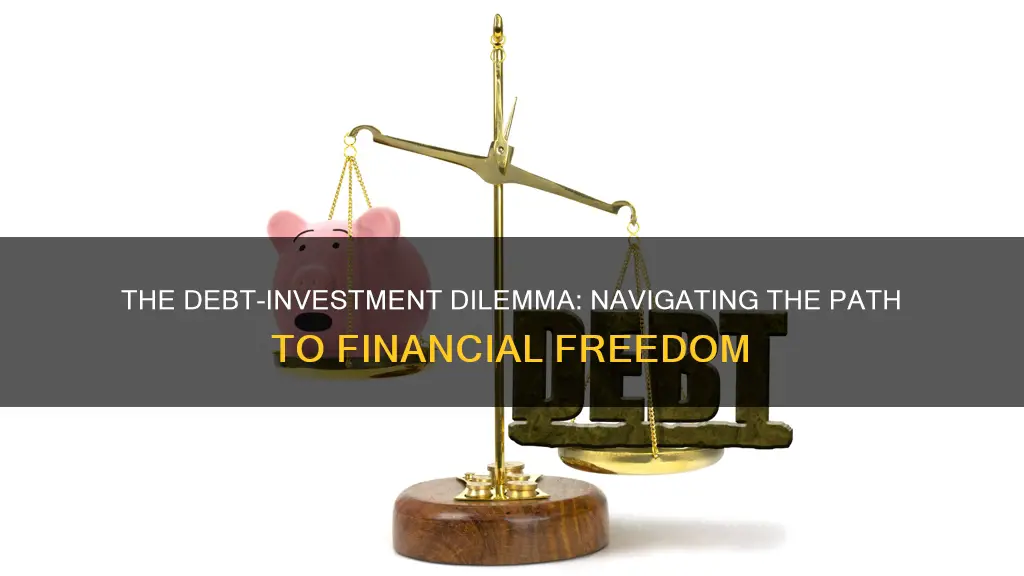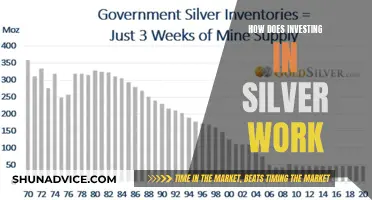
Whether to pay off debt or invest is a common dilemma. Both are good uses for any spare cash, and the best option depends on individual circumstances.
If you have high-interest debt, such as credit card debt, it's best to pay this off first. Credit cards often carry the highest interest rates, and the average interest rate on credit cards is around 20%. By tackling this first, you could save thousands in interest.
However, if you have a low-interest loan, such as a mortgage or student loan, investing might be a better option. If you can earn more interest on your investments than your debts are costing you, then investing makes sense. For example, if you have a mortgage with an interest rate of 5% and a stock market index fund that is returning 10% a year, you’ll be better off investing your extra cash in the index fund.
It's also important to consider your risk tolerance. Investing in the stock market can be volatile, and some people may prefer the guaranteed return of paying off debt.
In summary, paying off high-interest debt first is generally the best option, but if you have low-interest debt, investing might be a better way to build your net worth.
| Characteristics | Values |
|---|---|
| Interest rate on debt | If the interest rate on your debt is 6% or greater, you should generally pay it off before investing. |
| Type of debt | Credit card debt often carries the highest interest rates, so it should be prioritised. |
| Credit score | Carrying a lot of debt can negatively impact your credit score, which can affect your loan options and housing. |
| Cash flow | Paying off debt means you will have more money to put towards other financial goals. |
| Risk tolerance | If you are comfortable taking a risk with your investments, you may be a better candidate for investing. |
| Tax incentives | Some types of interest, like student loans or mortgages, may offer a tax incentive. |
| Emergency fund | It is recommended to have an emergency fund before investing. |
| Retirement plan | Many companies offer to match a percentage of your retirement plan contributions, so this should be prioritised. |
What You'll Learn

Compare interest rates on debt and investments
When deciding whether to pay off debt or to invest, it is important to compare the interest rates on your debt with the expected return on your investments.
If you are paying off debt, it is beneficial to start by tackling high-interest debt, such as credit card debt, which can often have interest rates of around 20%. By paying off this type of debt first, you will save money on interest in the long run. Additionally, credit card debt can negatively impact your credit score, which can lead to higher interest rates and fewer loan options in the future.
On the other hand, if you are investing, it is important to understand the basics of investing and the potential risks involved. Investing in the stock market, for example, offers the potential for higher returns over the long term, but it also comes with increased risk.
When deciding between paying off debt and investing, consider the interest rates of your debt and the expected return on your investments. If you have high-interest debt, it is generally advisable to prioritize paying that off first. However, if you have low-interest debt and expect to earn higher returns from investing, you may want to consider investing first.
It is also important to note that everyone's financial situation is different, and there is no one-size-fits-all solution. Other factors to consider include your budget, emergency savings, retirement plans, and personal risk tolerance. Seeking advice from a financial professional can help you make the decision that is right for your individual circumstances.
Unit Trust: Why Invest?
You may want to see also

Consider your risk tolerance
When deciding whether to pay off debt or invest, it's important to consider your risk tolerance. Risk tolerance is the degree of risk that an investor is willing to accept given the volatility in the value of an investment. It often determines the type and amount of investments that an individual chooses.
An investor with a higher risk tolerance may be more willing to invest in stocks, equity funds, and exchange-traded funds (ETFs), while those with a lower risk tolerance may prefer bonds, bond funds, and income funds. Age, investment goals, and income all contribute to an investor's risk tolerance.
If you have a high-interest debt, such as credit card debt, it may be wise to focus on paying that off first. Credit card interest rates can be very high, often exceeding the average returns in the market. By tackling high-interest debt first, you can save a significant amount of money in interest payments. Additionally, carrying a lot of debt can affect your credit score, leading to higher interest rates and fewer loan options.
On the other hand, investing early and consistently can help build wealth over time. Compounding interest can help your investments grow exponentially. However, investing in the stock market or other volatile assets can be risky, and there is no guarantee of high returns. If you are comfortable with taking on more risk and have a long time horizon for your financial goals, investing may be a good option.
It's important to note that paying off debt and investing don't have to be mutually exclusive. A hybrid approach that involves both paying off debt and investing can help you achieve both short-term and long-term financial goals. This approach allows for more flexibility and can be adjusted as your financial situation changes.
Smart Places to Invest $1 Million
You may want to see also

Weigh up the pros and cons of each option
The pros of paying off debt first
- The sooner you eliminate debt, the less interest you will have to pay.
- With no debt payments, you may have more money in your budget to save and invest.
- Reducing debt can improve your credit score, which is important if you want to buy a home or finance a vehicle.
- Being able to escape credit card or loan payments can be a weight off your shoulders. Waiting to pay off debt means you carry that burden longer and rack up more interest charges.
- If you have a lot of credit card debt, you should focus on paying that off first. Credit cards often carry the highest interest rates, which can far exceed average returns in the market.
- Carrying a lot of debt can affect your credit score, which can lead to higher interest rates and fewer loan options. It can also make it harder to find housing.
- Paying off debt means you'll have more money available to put toward other financial goals, such as investing, adding to your emergency fund, or saving for retirement.
- Having debt can be a significant source of stress and anxiety, which can have a negative effect on all aspects of life. Paying it off can give you peace of mind and allow you to focus on other financial, personal, and family goals.
The pros of investing first
- Investing is an essential part of building wealth over time. When you invest, your money has the potential to grow and generate income.
- The longer you invest, the more time your money has to benefit from compounding interest. Compounding interest is the interest earned on your interest.
- If you can earn more on your investments than your debts are costing you in terms of interest, then it makes sense to invest.
- Investing for the long term involves increased growth potential.
- Investing allows you to diversify your portfolio and spread your risk across different asset classes.
- Student loan interest and mortgage loan interest are tax-deductible. Deductions reduce your taxable income for the year, meaning less of your money is taken by the IRS.
- If you have a loan or credit card with a low-interest rate, you can wait to pay off that debt. Instead, that money can be invested and earn more money faster than interest accumulates.
Investing: Fear or Loathing?
You may want to see also

Assess your budget
Budgeting is essential when deciding whether to pay off debt or invest. It can be challenging to juggle basic expenses like rent, utilities, transportation, and groceries, and it is important to ensure that you are paying for these with ease and have money left over. If you are in this position, the next step is deciding how to spend your extra cash.
A good first step is to create a budget that separates your spending into buckets and assigns a percentage of your income to each. A popular budgeting method is the 50/30/20 rule, which creates three spending buckets based on your monthly income:
- 50% of your income should go toward “needs”
- 30% of your income should go toward “wants”
- 20% of your income should go toward savings and debt repayment
However, this method might not work for everyone, especially those with lower incomes. In this case, you may need to adjust your budget to ensure you are covering your basic expenses and putting some money into savings.
Another strategy is zero-based budgeting, where your income minus expenses equals zero. This means that every dollar in your budget serves a purpose, and you allocate a certain amount toward debt repayment. For example, if you make $3,400 after taxes per month, your debt repayment budget may look like:
- $1,700 for rent
- $600 for groceries
- $400 for transportation
- $200 for utilities
- $300 for insurance
- $200 for personal care
At the end of the month, all $3,400 is accounted for and allocated to a specific category, with the amount coming down to $0.
It is also important to have an emergency fund to fall back on for unexpected expenses. This should be a long-term goal of three to six months' worth of expenses.
Once you have a clear understanding of your budget and spending patterns, you can decide whether to pay off debt or invest. If you are paying high-interest debt, it is generally recommended to focus on paying that off first, as it will cost more over time and be more challenging to pay off. Credit card debt, for example, often carries high interest rates, and it is recommended to tackle this first.
However, it is also important to consider your financial goals and risk tolerance. Investing early can help build wealth over time, but it also comes with increased risk. If you are feeling stressed about your debt, there is nothing wrong with paying it down sooner, as this can give you peace of mind.
In summary, assessing your budget is a crucial step in deciding whether to pay off debt or invest. It allows you to understand your spending patterns, allocate money effectively, and make informed decisions about debt repayment and investing.
Zack's Investment Recommendations: Current Insights
You may want to see also

Think about your credit score
When deciding whether to pay off debt or invest, it's important to think about your credit score. This is because your credit score can impact your financial goals and influence your ability to borrow money or access financial products.
Your credit score is a measure of your financial health and it indicates to lenders how responsibly you use credit. The higher your score, the more likely you are to be approved for loans or new lines of credit, and the lower the interest rates you'll have to pay. A good credit score can also make it easier to find housing and rent a car, and it can even affect your ability to get life insurance.
Paying off debt can improve your credit score by lowering your credit utilisation ratio, which is the amount of credit you're using compared to the total credit available to you. A lower ratio indicates to lenders that you're using credit responsibly. It also reduces your overall debt load, which can positively impact your debt-to-income ratio and make it more likely that you'll be able to manage additional debt. Additionally, making timely payments and keeping credit card balances low can contribute positively to your payment history, which accounts for a significant portion of your credit score.
However, it's important to note that simply paying off debt may not always lead to a higher credit score. The age of your credit accounts also matters; closing old credit accounts can lower your available credit and increase your credit utilisation ratio, which could negatively impact your score. Additionally, if your debt is nearing the statute of limitations (the time within which creditors can legally pursue legal action for missed debt payments), leaving it untouched might be strategic as engaging with your credit accounts restarts this clock. Similarly, once a debt is charged off (meaning the creditor has written it off as a loss), paying it off may not significantly improve your credit score, although it may look better to lenders manually reviewing your credit report.
Your Guide to Choosing the Right Investment
You may want to see also
Frequently asked questions
It depends on your individual circumstances. If you have high-interest debt, it is generally recommended to pay that off first, as it will cost you more over time. However, if you have low-interest debt, investing may be a better option, as you can earn more on your investments than your debts are costing you.
The sooner you eliminate debt, the less interest you will have to pay. Paying off debt can also improve your credit score, which is important if you want to take out future loans, and it can reduce stress and anxiety.
Investing early allows you to take advantage of compounding interest, which can help your money grow exponentially over time. Investing also offers the potential for higher returns than paying off low-interest debt and can help you build wealth over time.
Yes, a hybrid approach that balances paying off debt and investing can be effective in achieving both short-term and long-term financial goals. It is important to have a detailed budget and financial plan to ensure you are making progress toward your goals.







